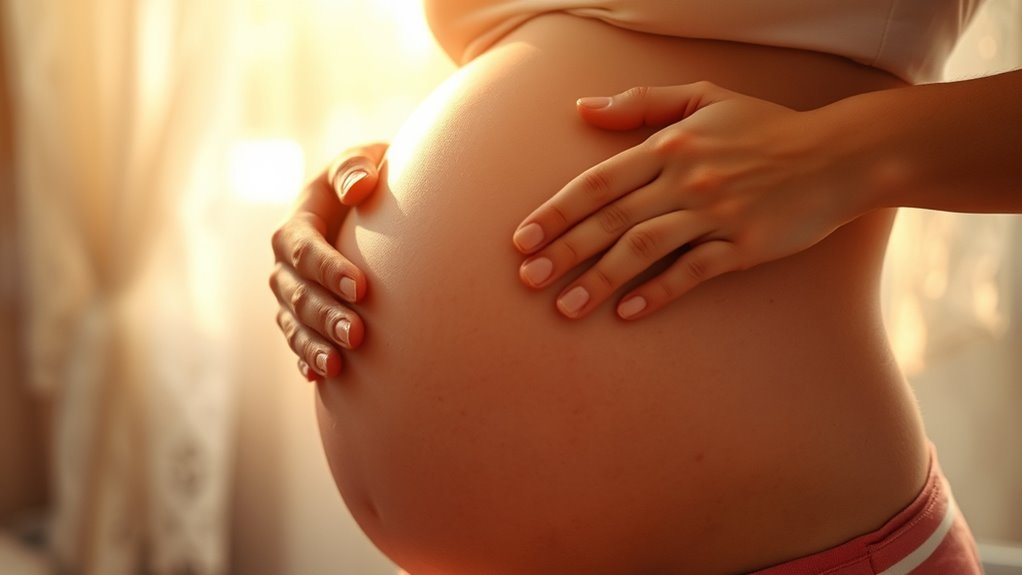Pregnancy sweating happens because of hormonal changes and increased metabolism, which raise your body temperature. Your hypothalamus, responsible for regulating temperature, gets affected too. As your blood volume increases, you may feel warmer. Up to 35% of pregnant women experience sweating, especially in the third trimester. It can disrupt sleep and lead to dehydration if not managed. Discover practical tips to stay comfortable and cope with these changes during this transformative time.
Key Takeaways
- Hormonal changes, particularly increased estrogen and progesterone, significantly contribute to pregnancy sweating.
- The hypothalamus, which regulates body temperature, is altered during pregnancy, leading to increased perspiration.
- A heightened metabolism and increased blood volume generate more body heat, causing excessive sweating.
- Blood vessel dilation near the skin’s surface helps facilitate sweating as the body adapts to pregnancy.
- Up to 35% of pregnant women experience hot flashes or night sweats, especially peaking in the third trimester.

Experiencing pregnancy sweating can be surprising, especially since it often begins early in your journey. You might find yourself waking up drenched in sweat during the night or feeling an unexpected wave of heat hit you during the day. This phenomenon is primarily due to the hormonal changes your body undergoes, specifically the increases in estrogen and progesterone. These hormonal surges can confuse your hypothalamus, the part of your brain responsible for regulating body temperature, leading to increased perspiration.
Pregnancy sweating can start early, with hormonal changes causing unexpected heat and increased perspiration.
Up to 35% of pregnant women report experiencing hot flashes or night sweats. You may notice that these symptoms can vary in intensity, often peaking during the third trimester when hormonal fluctuations intensify. As your body adapts to pregnancy, your metabolism ramps up, generating more body heat. Additionally, the increased blood volume and the dilation of blood vessels near your skin’s surface can contribute to that feeling of increased warmth, resulting in more sweating.
It’s not just the heat that can be uncomfortable; excessive sweating can disrupt your sleep, making you feel irritable and fatigued. You might find yourself changing clothes and bedding more frequently, which can be a hassle. Plus, if you’re not careful about staying hydrated, you could risk dehydration due to the increased sweating. Keeping yourself well-hydrated becomes essential during this time.
While some women experience a decrease in sweating during the second trimester, it often returns with a vengeance in the third trimester. After giving birth, you might think the sweating would stop, but it often continues due to hormonal adjustments and the impact of breastfeeding. The drop in estrogen and progesterone levels can lead to postpartum night sweats, which typically resolve within a few weeks.
Managing pregnancy sweating is crucial for your comfort. You can create a cooler environment by using fans or air conditioning, and wearing loose, moisture-wicking clothing can help as well. Staying away from spicy foods and hot baths may also reduce your sweating episodes. Using lightweight blankets and keeping a towel handy for those sweatiest nights can aid your sleep.
Frequently Asked Questions
Can Pregnancy Sweating Indicate a Medical Issue?
Yes, pregnancy sweating can indicate a medical issue.
If you notice persistent night sweats, especially if accompanied by symptoms like fever, rapid heartbeat, or weight loss, it’s important to seek medical advice.
These could signal hormonal imbalances or infections that need attention.
Always keep an open line of communication with your healthcare provider about any unusual symptoms you experience during pregnancy, ensuring you and your baby stay healthy.
How Can I Manage Excessive Sweating During Pregnancy?
Imagine sitting in a sauna, the heat wrapping around you like a thick blanket.
To manage excessive sweating during pregnancy, you can start by staying cool with fans or air conditioning.
Opt for lightweight, breathable clothing, and schedule activities during cooler parts of the day.
Drink plenty of water, and avoid spicy foods.
Taking cool showers can refresh you, while talc-free powder helps keep moisture at bay.
You’ve got this!
Does Pregnancy Sweating Affect the Baby’s Health?
No, pregnancy sweating itself doesn’t directly affect your baby’s health.
However, it’s crucial to monitor your body temperature and stay hydrated, as overheating can lead to complications.
If you experience excessive sweating, it might be a sign to cool down and avoid hot environments.
Remember, maintaining a comfortable temperature is key to ensuring both your well-being and that of your baby.
Always consult your healthcare provider if you have concerns.
When Does Pregnancy Sweating Typically Start and End?
Pregnancy sweating can hit you like a surprise summer storm.
Typically, it begins in early pregnancy and can continue throughout, peaking in the third trimester. You might notice those night sweats becoming more frequent as your body adjusts.
After giving birth, you could still experience sweating as your hormones settle down.
Are Certain Foods Linked to Increased Sweating in Pregnancy?
Yes, certain foods can contribute to increased sweating during pregnancy.
Spicy foods, for instance, raise your body temperature, leading to more perspiration. Caffeine and alcohol act as stimulants, which can also amplify sweating.
Additionally, high-sugar foods may boost your metabolism, generating excess heat.
If you find yourself sweating more than usual, it might be wise to monitor your diet and see if making adjustments helps.
Stay cool and comfortable!
Conclusion
In the whirlwind of pregnancy, sweating might seem like a nuisance, but it’s your body’s way of nurturing life. Embracing this change can deepen your bond with your growing baby, reminding you that every drop of sweat signifies strength and transformation. After all, isn’t it beautiful how your body adapts to create a miracle? So, while you wipe your brow, remember: these moments of discomfort are part of a remarkable journey toward motherhood.









